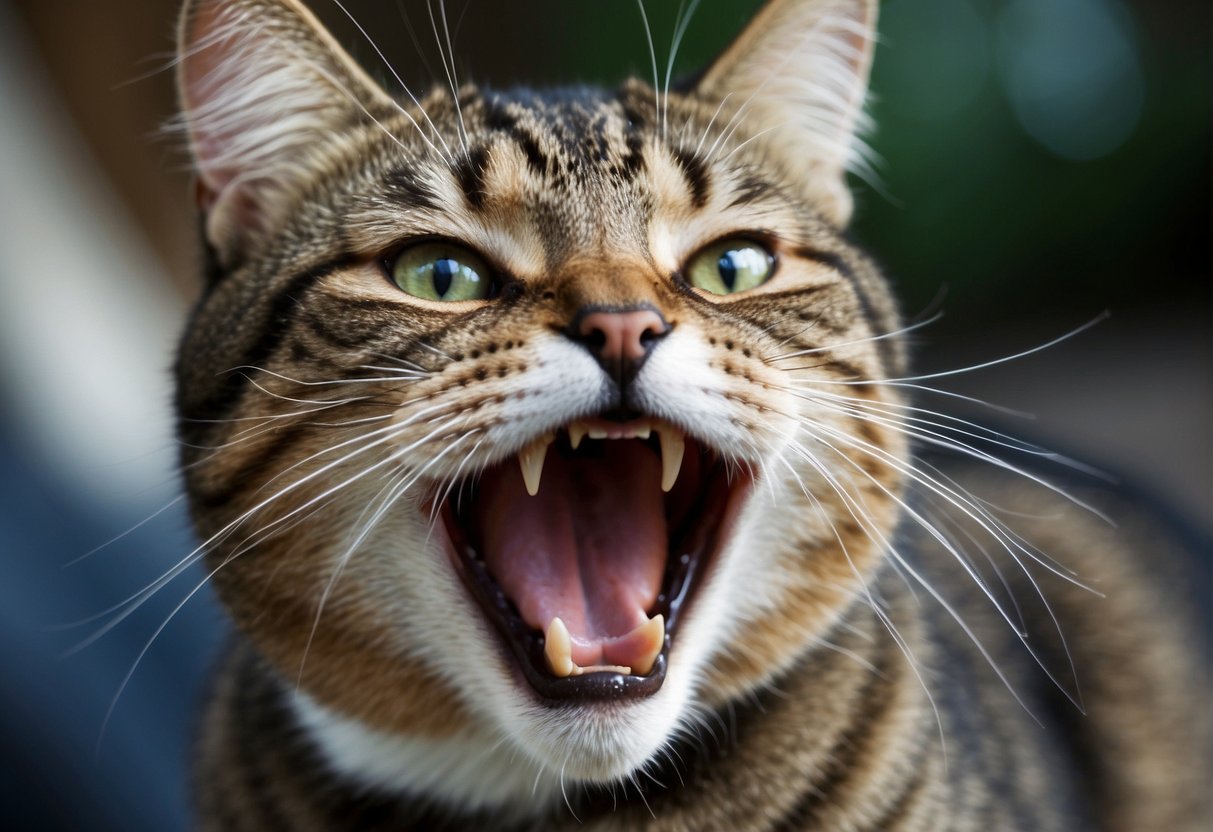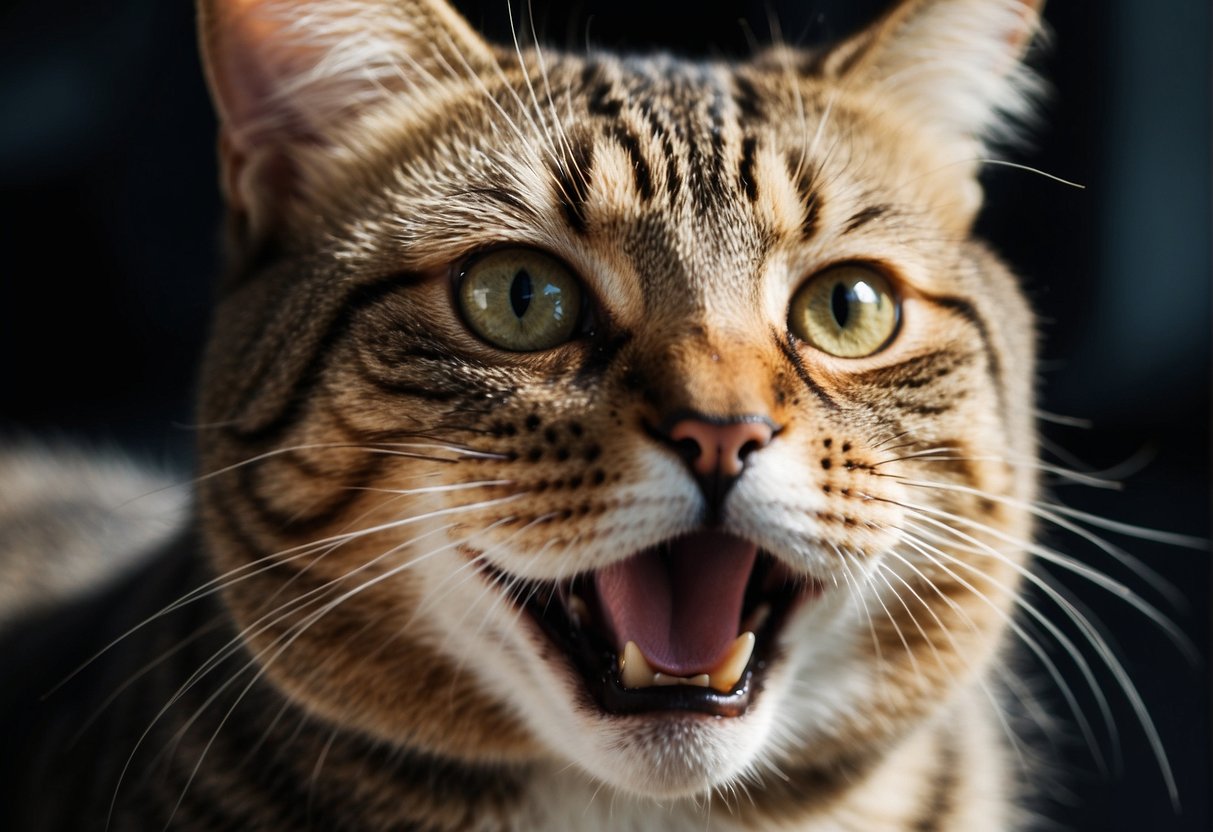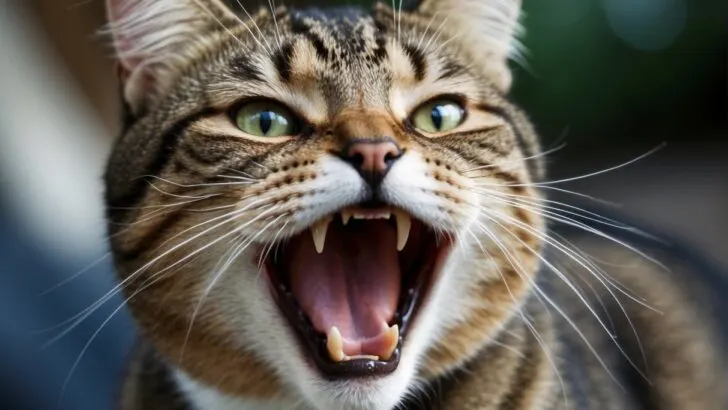When your cat grinds their teeth, it’s an action that might catch your attention during snuggle time or while they’re munching on their favorite treat. You might hear a distinctive clicking or see their jaw moving peculiarly, which could understandably leave you wondering about the health of your kitty.
Just like humans, cats can experience dental problems that lead to such behaviors, and the reasons behind this toothy issue are both varied and important to understand.

Grinding in cats, known as bruxism, often indicates oral discomfort caused by issues like inflamed gums or dental disease.
I’ve observed this subtle jaw dance when my own feline friend seemed a bit off and later found out they were dealing with some pesky tooth resorption. Imagine your own toothache, now think of how a small creature like a cat might react to that constant irritation—it’s only natural they’d try to find a way to cope.
Besides dental woes, teeth grinding can be symptomatic of other underlying health issues that may not be immediately associated with oral health at a casual glance. For instance, conditions such as arthritis or gastrointestinal upset can manifest through this seemingly unrelated behavior.
The Normality Of Cat Teeth Grinding

When your feline friend starts grinding their teeth, it can be a puzzling behavior. Picking up on the signs and understanding the possible reasons behind this bruxism is crucial for your cat’s health.
Identifying the Signs
You might notice your cat exhibiting teeth grinding or what we call feline bruxism. This is characterized by certain symptoms:
- Chattering: A rapid vibration of the jaw that appears as though your cat is lightly chattering their teeth, especially when eating or yawning.
- Clicking or scraping sounds: You may hear these when your cat is opening or closing their mouth.
- Drooling: Excessive salivation can sometimes accompany teeth grinding.
- Bad breath: An unpleasant odor from your cat’s mouth is not to be ignored.
- Weight loss: It may occur if grinding is linked with pain or discomfort leading to difficulty in eating.
- Visual discomfort: Pay attention to your cat’s behavior; reluctance to eat or pawing at the mouth could indicate pain.
Possible Causes of Teeth Grinding
Several underlying issues can cause teeth grinding, but the main culprit usually relates to oral pain or discomfort. Here’s a breakdown:
- Dental disease: Problems in the mouth like gum disease, tooth resorption, or gingivitis can lead to pain and subsequent grinding.
- Malocclusion: When a cat’s teeth don’t align properly, it can cause an irregular bite leading to bruxism.
- Foreign object: Occasionally, something stuck in the mouth can irritate your cat.
- Tumors or growths: These may not be common but can cause discomfort and bruxism if they are present in the mouth.
- Other Health Issues: Conditions like kidney disease or high blood pressure can manifest in the form of teeth grinding.
Health Issues Related to Teeth Grinding
Teeth grinding in cats, often known as bruxism, can be a sign of underlying health issues requiring attention.
Dental and Oral Health Concerns
Your cat’s dental health is a cornerstone of their overall well-being, and issues here can lead to teeth grinding. Cavities and tartar build-up can cause discomfort, prompting your cat to grind their teeth.
Conditions such as gum disease and stomatitis (severe mouth inflammation) are particularly painful and could result in bruxism. Be aware of signs like swelling, bad breath, and reduced appetite, as these may indicate periodontal disease. Regular veterinary dental check-ups can help prevent these painful conditions.
- Common Oral Health Issues Leading to Bruxism
- Cavities and tartar
- Gum disease
- Oral ulcers and stomatitis
Systemic and Neurological Conditions
If your cat’s teeth grinding isn’t due to dental distress, it may be a symptom of broader systemic or neurological conditions. A cat experiencing abdominal pain from ailments like pancreatitis, inflammatory bowel disease (IBD), or irritable bowel syndrome (IBS) may respond by grinding their teeth. Neurological issues, such as seizures or brain tumors, could also manifest in this way.
Another condition to consider is hypokalemia, characterized by low potassium levels. Cats with any of these health concerns often require comprehensive medical assessments including lab work, imaging, and sometimes biopsies to diagnose the problem accurately.
- Systemic and Neurological Issues That Can Cause Bruxism
- Pancreatitis, IBD, IBS
- Hypokalemia
- Seizures and brain tumors
It’s clear that teeth grinding can be much more than just a quirky habit; it’s a potential indicator of pain or discomfort.
Diagnosis and Treatment Options
When your cat exhibits symptoms like teeth grinding, it’s crucial to understand the underlying causes and the appropriate treatment options to ensure their continued oral health and comfort.
Professional Diagnosis
To accurately diagnose the root cause of your cat’s teeth grinding, it is essential to consult with a veterinarian. During the examination, the vet will look for signs of dental issues such as loose teeth, swollen gums, or a tumor around the gum line.
They may recommend dental X-rays or other tests to better understand your cat’s oral health. Symptoms like excessive drooling and visible signs of oral discomfort are crucial for the vet to detect and can often lead to an accurate diagnosis.
Treating Teeth Grinding
Once diagnosed, the treatment for teeth grinding will aim to address the underlying health problems:
- Dental Issues: Broken or loose teeth may require extraction, and treatment for gum disease might include professional cleanings or medication.
- Diet Adjustment: Sometimes, changing your cat’s diet can help manage dental health.
- Oral Care: Regular brushing with cat-specific toothpaste and toothbrush can prevent many dental issues.
- Medication or Supplements: Your vet might prescribe medications or suggest dietary supplements to improve oral health.
- Behavioral Approaches: If stress is a factor, you might need to identify stressors in your cat’s environment and work on reducing them.

My name is James, and welcome to FAQCats!
Along with our team of cat owners, expert pet enthusiasts, and pet professionals, we aim to write engaging helpful, engaging content about cats. At FAQCats we strive to provide content that’s accurate and fun to read. Our team writes about everything related to cats; even the most complex of topics. Through extensive research and caring for our own fur-pals, we’re able to provide something cat owners worldwide will love. Have a look around, and leave us feedback anytime!

